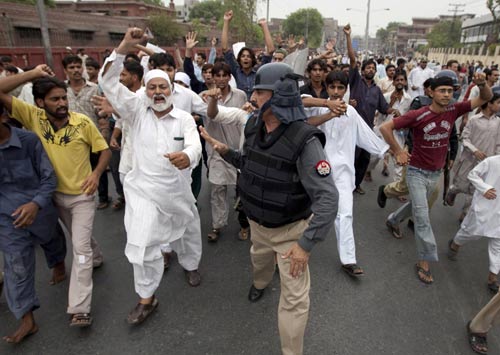Asia-Pacific
Pakistanis blame US after shrine attack kills 42
(Agencies)
Updated: 2010-07-03 15:06
 |
Large Medium Small |
 |
|
A riot policeman tries to calm people condemning the suicide bomb blasts at a Sufi shrine, as they march through the streets of Lahore July 2, 2010. [Agencies] |
ISLAMABAD - A twin suicide attack that killed 42 at Pakistan's most popular Sufi shrine has angered and frustrated Pakistanis, with some saying Friday that the solution to the country's terror threat is a US exit from Afghanistan.
Most of some two dozen Pakistanis interviewed said that even if Islamist extremists were behind the slaughter at the Data Darbar shrine in Lahore, the root cause of the violence was America's war in Afghanistan, its missile strikes in Pakistan's tribal regions, and its alliance with Islamabad.
"America is killing Muslims in Afghanistan and in our tribal areas, and militants are attacking Pakistan to express anger against the government for supporting America," explained Zahid Umar, 25, a frequent visitor to the Lahore shrine.
Qaiser Hameed, a car dealer in the southern city of Karachi, said the attacks that have occurred in Pakistan are "directly linked with the situation in Afghanistan and the American aggression there.
"There should be efforts to start negotiations with all the stakeholders in Afghanistan, especially those disgruntled elements who are resisting the American occupation there," he said.
Even those who blamed others saw an American hand in the attacks. Arifa Moen, 32, a teacher in Multan, said Washington "is encouraging Indians and Jews to carry out attacks" in Pakistan.
The targeted shrine was that of an 11th century Sufi saint, Ali bin Usman, commonly known as Data Ganj Bakhsh Hajveri, who traveled throughout the region spreading Islam with a message of peace and love. His shrine is the most revered and popular of Sufi shrines in the nation.
Thousands had gathered at the green-domed shrine when the bombs went off minutes apart. The blasts ripped concrete from the walls and left the white marble floor awash with blood.
There was no claim of responsibility, but Islamist extremists consider Sufism - a mystical strand of Islam - to be heretical. They have a history of attacking Shiites, non-Muslims and others they deem unacceptable. About a month ago, gunmen and suicide bombers attacked two mosques of the minority Ahmadi sect in Lahore, killing 93 people.
Pakistani officials condemned Thursday's bombings, using language they have frequently used to try to convince the population that the fight against militancy is not one they can ignore.
"Those who still pretend that we are not a nation at war are complicit in these deaths," said Farahnaz Ispahani, a spokeswoman for Pakistani President Asif Ali Zardari.
UN Secretary-General Ban Ki-moon strongly condemned the attack and said "the deliberate targeting of a crowded place of worship makes this particularly vicious," UN associate spokesman Farhan Haq said at U.N. headquarters in New York.
Polls in recent years have shown that support for the Taliban has dropped in Pakistan dramatically as violence has exploded. But that hasn't been coupled by a surge in support for the US or the Pakistani government's alliance with it.
An opinion poll by the International Republican Institute conducted last summer found that 80 percent of Pakistanis believed the country should not cooperate with America in the war on terror. The poll had a margin of error of 1.41 percentage points.
The US Embassy said the Lahore attack "demonstrates the terrorists' blatant disregard for the lives of the Pakistani people and the future of this country" and that the US "will continue to support Pakistan in the fight against a common enemy."
America has expanded its outreach here in recent months. The US also has pledged to spend $7.5 billion over five years here for humanitarian assistance, and is trying to help Pakistan overcome crises in its energy and water sectors.



